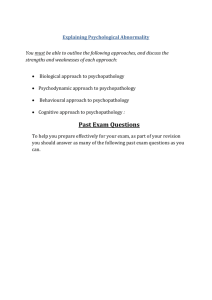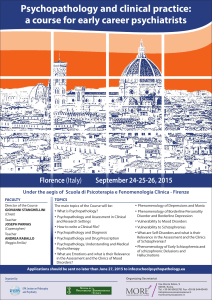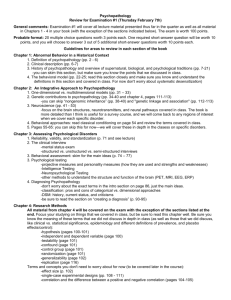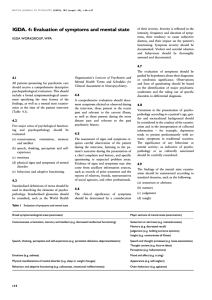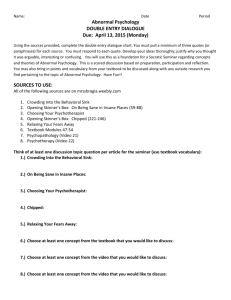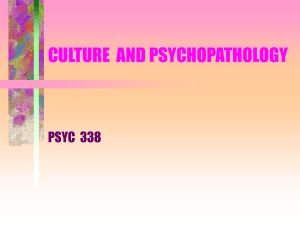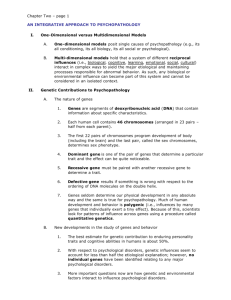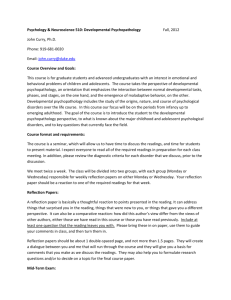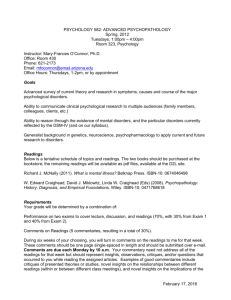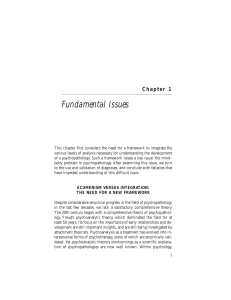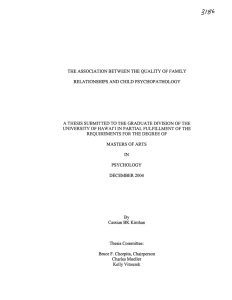University Association for Research in Fundamental
advertisement
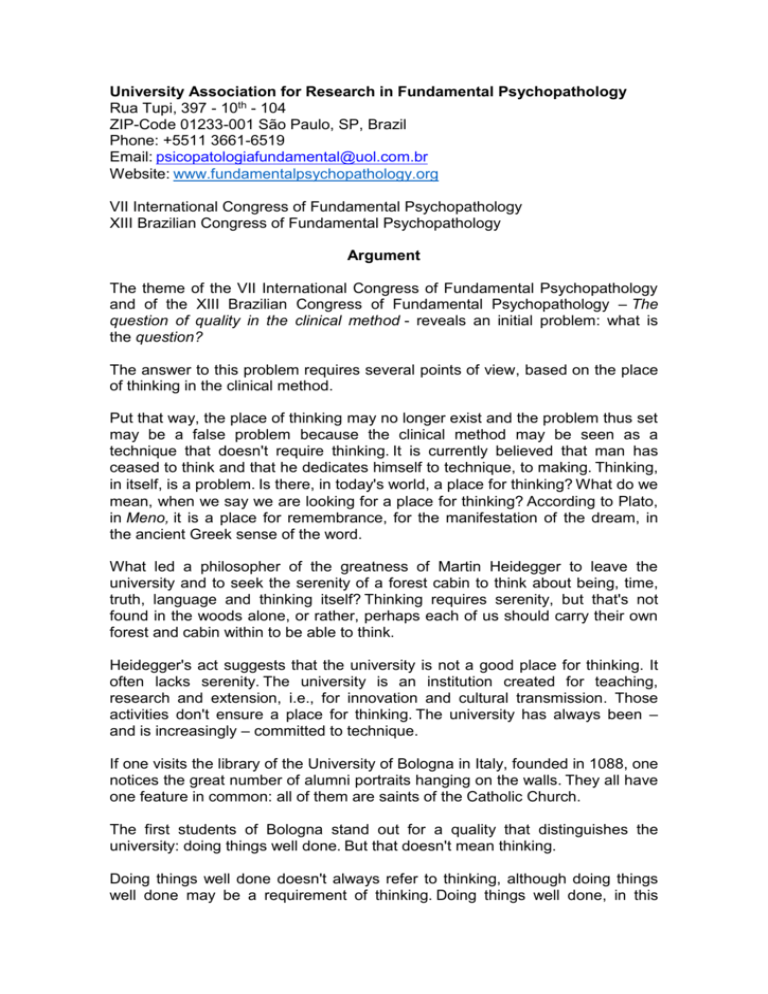
University Association for Research in Fundamental Psychopathology Rua Tupi, 397 - 10th - 104 ZIP-Code 01233-001 São Paulo, SP, Brazil Phone: +5511 3661-6519 Email: psicopatologiafundamental@uol.com.br Website: www.fundamentalpsychopathology.org VII International Congress of Fundamental Psychopathology XIII Brazilian Congress of Fundamental Psychopathology Argument The theme of the VII International Congress of Fundamental Psychopathology and of the XIII Brazilian Congress of Fundamental Psychopathology – The question of quality in the clinical method - reveals an initial problem: what is the question? The answer to this problem requires several points of view, based on the place of thinking in the clinical method. Put that way, the place of thinking may no longer exist and the problem thus set may be a false problem because the clinical method may be seen as a technique that doesn't require thinking. It is currently believed that man has ceased to think and that he dedicates himself to technique, to making. Thinking, in itself, is a problem. Is there, in today's world, a place for thinking? What do we mean, when we say we are looking for a place for thinking? According to Plato, in Meno, it is a place for remembrance, for the manifestation of the dream, in the ancient Greek sense of the word. What led a philosopher of the greatness of Martin Heidegger to leave the university and to seek the serenity of a forest cabin to think about being, time, truth, language and thinking itself? Thinking requires serenity, but that's not found in the woods alone, or rather, perhaps each of us should carry their own forest and cabin within to be able to think. Heidegger's act suggests that the university is not a good place for thinking. It often lacks serenity. The university is an institution created for teaching, research and extension, i.e., for innovation and cultural transmission. Those activities don't ensure a place for thinking. The university has always been – and is increasingly – committed to technique. If one visits the library of the University of Bologna in Italy, founded in 1088, one notices the great number of alumni portraits hanging on the walls. They all have one feature in common: all of them are saints of the Catholic Church. The first students of Bologna stand out for a quality that distinguishes the university: doing things well done. But that doesn't mean thinking. Doing things well done doesn't always refer to thinking, although doing things well done may be a requirement of thinking. Doing things well done, in this case, would be a provision for recollection, for the visit of dreams, as Dodds reminds us in The Greeks and the irrational. The contemporary university values the amount of technical production, which also refers to doing things well done. Here, thinking is no longer important and has become irrelevant, because it is deemed useless from the technical point of view. In technique, there is no place for the dream of doing things well done. In addition, technique focuses on communication. As long as communication enriches inventors, the university will value projects in that area. However, let us go back to the aforementioned question. Why did Freud get away from the Hospital and the university and created a device which allowed him to devote himself to Psychoanalysis as psychotherapy and as a research method? By defining his discipline, Freud created a place for thinking. Thinking is the path towards language. It is, therefore, a method: the way of thinking language and its limit, the unspeakable. However, history confirms that educational institutes, such as the university, aren't necessarily a place for thinking. They tend to become technical devices. When those institutional devices become technical, language is forgotten, i.e., there is no place for the search for truth, understood here as that which is revealed by language and contains violence, according to Foucault. Thus, there isn't any place to think about language itself. To find that, one has to leave those devices, as Andreas Vesalius of Brussels, the father of modern anatomy, who left the University of Paris, ruled by the chair, in approximately 1530, for the city's ossuaries. The clinical method depends on a radical concept of the other. The other, the one who torments us for being enigmatic and obscure, who is unspeakable and pushes us to the edge of the abyss, according to Plinio Prado, requires a place for thinking. However, that place may not just be a place of hospitality, which implies hostility as well, as suggested by Derrida. In such as case, doing things well done, as opposed to technique, implies the readiness to be exposed to the unknown, the enigmatic, the obscure and ultimately to the unspeakable, i.e., to expose oneself to a risky path: the path towards the language of the pathic relationship. Establishing a relationship with the other depends essentially on a specific starting point, a place called Khora by Plato in Timaeus. Without the mark of the pathos, the logos doesn't come true and the clinic becomes technique, a discourse that lacks the other. To write the clinic, as did Freud, is an essential part of the way toward clinical language. The university isn't the place of the clinic. But then, how shall we articulate the restricted space of the university that focuses on quantitative reproduction of quality with the place of the clinic which, even though urgent, isn't restricted? In addition to that, what are the requirements of the way of the clinical language? They are neither technical, nor restricted, or rather, they must take a distance from technique, which is restricted by its very nature. But, that distance requires doing things well done. Language is not only what is said. It's what is said with quality. The only award won by Freud refers to the quality of his writing. The clinical language requires a style, i.e., a clinical mode of expression. That style must feature quality: it must be clear or intelligible, be exact in its ambiguity, be fluid and lucid, but mainly allow and even stimulate thinking. Could the university be a place where that path, which started in therapy, would lead us toward clinical language? Can writing the clinic be taught? These are some of the points of view on the issue that motivated the University Association for Research in Fundamental Psychopathology (AUPPF) to set up the VII International Congress of Fundamental Psychopathology and the XIII Brazilian Congress of Fundamental Psychopathology and to invite the interested parties. The congress will take place in João Pessoa, at the Hotel Tambaú, from September 8-11, 2016.
